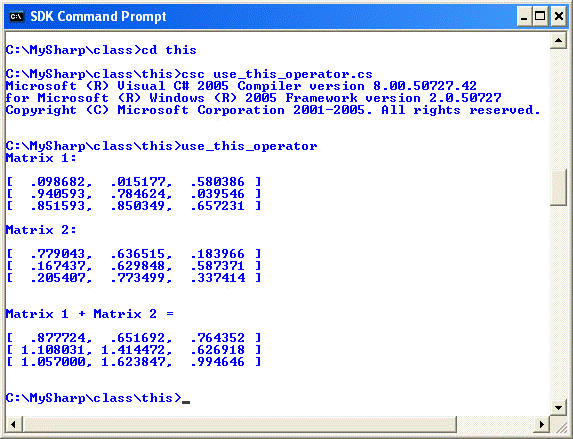// csc use_this_operator.cs
class Cube
{
// its a 3D matrix
public const int dimtype = 3;
private double[,] matrix = new double[dimtype, dimtype];
// allow callers to initialize
public double this[int x, int y]
{
get { return matrix[x, y]; }
set { matrix[x, y] = value; }
}
// let user add matrices
public static Cube operator +(Cube mat1, Cube mat2)
{
Cube newMatrix = new Cube();
for (int x=0; x < dimtype; x++)
for (int y=0; y < dimtype; y++)
newMatrix[x, y] = mat1[x, y] + mat2[x, y];
return newMatrix;
}
}
class MatrixTest
{
// used in the IntCube method.
public static Random rand = new Random();
// test Cube
static void Main()
{
Cube mat1 = new Cube();
Cube mat2 = new Cube();
// init matrices with random values
IntCube(mat1);
IntCube(mat2);
// print out matrices
Console.WriteLine("Matrix 1: ");
PrintCube(mat1);
Console.WriteLine("Matrix 2: ");
PrintCube(mat2);
// perform operation and print out results
Cube mat3 = mat1 + mat2;
Console.WriteLine();
Console.WriteLine("Matrix 1 + Matrix 2 = ");
PrintCube(mat3);
}
// initialize matrix with random values
public static void IntCube(Cube mat)
{
for (int x=0; x < Cube.dimtype; x++)
for (int y=0; y < Cube.dimtype; y++)
mat[x, y] = rand.NextDouble();
}
// print matrix to console
public static void PrintCube(Cube mat)
{
Console.WriteLine();
for (int x=0; x < Cube.dimtype; x++)
{
Console.Write("[ ");
for (int y=0; y < Cube.dimtype; y++)
{
// format the output
Console.Write("{0,8:#.000000}", mat[x, y]);
if ((y+1 % 2) < 3)
Console.Write(", ");
}
Console.WriteLine(" ]");
}
Console.WriteLine();
}
}
